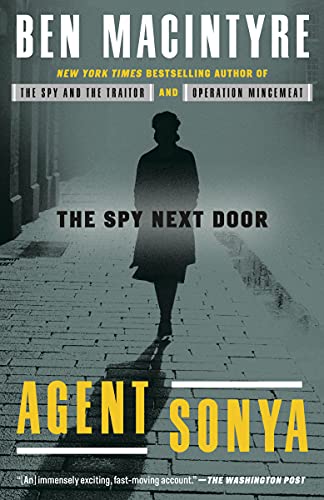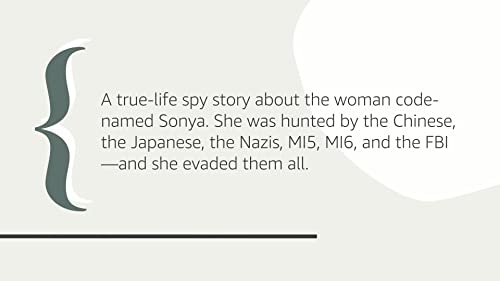


Agent Sonya: The Spy Next Door
V**N
Female Spy Unbelievable Excellent
This book is about the extraordinary succesful Soviet communist spy who was never caught due in part her skill and the inept British MI5 investigator(s). She was instrumental in obtaining secrets re building the atomic bomb and her personal life also is interesting if not amazing. You will enjoy this non fictional account of a dangerous woman.
J**D
Leading Behind The Scenes
When I see Ben Macintyre's name on a new book I buy it and start reading it right away, certain in the knowledge that I will be enjoying a well written, well researched, fascinating chronicle of modern espionage. Agent Sonya is a worthy successor to such brilliant Macintyre works as The Spy and the Traitor and A Spy Among Friends, with a critical difference: the major protagonist is female.Ursula Kuczynski was a member of a prominent and wealthy German Jewish family active in Berlin's intellectual and artistic circles. In her childhood she lived through Germany's defeat in World War I, and as a teenager she witnessed the mounting tensions and rising anti-Semitism that led to the fall of the Weimar Republic and its replacement with Hitler's Third Reich. Like many in her generation Ursula became a Communist, not so much for ideological reasons as because she saw the Soviet Union as the strongest enemy of Fascism. Helped by her family's left-wing connections, Ursula journeyed to the Soviet Union, was recruited as a spy by Stalin's many-tentacled intelligence services, and spent years in Shanghai, Mukden, Moscow, Switzerland, and eventually rural England on various espionage assignments using the code name Sonya. Along the way she had a passionate affair with another Soviet spy, Richard Sorge, married or lived with three different men by whom she had three children, and jumped from one hair raising adventure to another. Her sex was an asset, since the Soviet and other intelligence services with whom she dealt were all highly male chauvinistic, and she was able to fly under the radar for many years, seeming to be nothing more than a nice normal wife and mother. Her most important contribution to the Soviet espionage effort was her connection with the physicist Klaus Fuchs, who passed an enormous amount of information on British and American efforts to build an atomic bomb through her to the Kremlin. Eventually, after Fuchs was exposed and arrested, Ursula and her family escaped to East Germany, where she lived for most of the rest of her life.Ursula's story seems too incredible even for the pages of a Fleming or Deighton spy thriller, but it all really happened, making Macintyre's extensively documented tale just as riveting as any James Bond adventure. If after reading Agent Sonya you are hungry for more such tales, I can recommend any of Macintyre's books, most especially A Spy Among Friends, which is about Kim Philby, another Soviet spy with whom Ursula had an indirect connection.
D**O
Another triumph for Mr Macintyre
I have read most of Macintyre’s books and they are all gripping.I found Agent Sonya a little more difficult to get into but once I did it did not disappoint. I have read reviews that have criticized the book for its subject matter. How can we relate to a Soviet spy? How can we feel anything for someone who worked for Stalin against the West? I think that is an over simplification.I tried to put myself in the shoes of Ursula Maria Kuczynski, a young German Jew horrified at the rise of fascism in Europe in the 20’s and 30’s. Like Ursula I would like to think that I would do all I could to resist and to fight. The natural vehicle for Ursula to travel in to conduct that fight was the communist party and she joined in 1926, just as Hitler was rising to prominence.European communists fought fascism in Spain, Germany, the Far East and Eastern Europe and were a major part of the French resistance. Ursula becomes a committed communist (and anti fascist) and an accomplished asset as we follow her from Germany to China and thereafter to Switzerland and finally to the UK.This is where the story becomes a little muddy for many. Yes, Ursula spied for Stalin, a man as despotic and evil as Hitler. But at that time Churchill and Roosevelt were working with the Soviet leader and we were allies.Ursula spied against the Nazi’s for the Soviets while in the UK but she also helped to infiltrate communist spies into the US atomic weapons program. In doing so she helped the Soviets to develop their own atomic bomb. Obviously this puts her beyond the pale for many people but the world was a different place 60 and 70 years ago. Who knows, without Ursula maybe we would not have had a world where both sides of the Cold War had the means to totally annihilate the other? Maybe in that scenario, without the promise of “mutually assured destruction”, a Nixon or a Reagan or, heaven forbid, a Trump may have been tempted to wipe out half the planet. We’ll never know.A great read, chock full of exceptionally interesting characters like Agnes Smedley, Richard Sorge and Sandro Rado and another triumph for Mr Macintyre.
J**A
Om
Como o fanatismo político pode motivar uma pessoa
R**F
Ambivalent
That’s exactly the type of book about intelligence in the context of history and politics, one may like but not really cherish. Well written and edited, content-rich, full of suspense, carefully paced chapters and final conclusions leaving the reader with the feeling to know now everything.The author managed to tell a gripping yarn with well researched biographic facts. Too strong a journalist touch though.In true journalistic manner, MacIntyre is „beefing up“ many episodes. Especially evident with the Sorge/Smedley/Hamburger episode in chapter 3, which is actually more „sexed up“. („Ursula never saw Richard Sorge again... no one noticed that her heart was broken“ p.75 - „She wondered if she would ever see him again, and the thought made her heart twist“ p.87)The Ursula Hamburger/Richard Sorge affair is made a live-long love affair. Based on Ruth Werner’s and Michael Hamburger’s hindsight writings/interview. Plus a good ’Gartenlaube’ touch. The ensuing episodes/affairs with Johann Patra, her second child, the withering relationship with her husband Rudolf, marriage with Len Beurton are penned in similar ways. It seems, the literary legacy of Ruth Werner was too enticing for MacIntyre. The distance he kept to her recorded attitude during the „Great Purge“ 1936-38, when she was in Moscow (page 140-143) was maybe more appropriate to her other scripts.MacIntyre’s style in English is using quite a bit cliché-ridden pictures. Few examples for many: „...the vastness of Russia slip past the window, an undulating ocean of birch forest stretching to the horizon.“ (p. 22)„The two women bonded over English tea served in bone china.“ (p.32)„Switzerland, peaceful land of cowbells and cuckoo clocks...“ (p.145)(There are only undulating oceans of birch forests in the vastness of Russia, of course - and guess what, Shanghai Cathay Hotel served English tea in bone china! Oh yeah, the Swiss cowbells. - Only the cuckoo clocks are wrongly placed, more a Black Forest cliché).Macintyre let Sonya, after her first successfully established radio communication from Switzerland with Moscow on 29 September 1938, „...turn on her transistor radio and tuning in on the BBC...“ - p. 153)There was no transistor radio in 1938. The first transistors were experimentally produced in 1947 in Germany and a bit later by Texas Instruments.There are a number of straight successions of quotations from Ruth Werner’s books or letters and fictitious dialogues giving a somewhat fallacious impression of authenticity to the latter.One thing struck me towards the end of the book, chapters 19-22:The author’s obvious disappreciation to the inducements of Sonya. My take is, apart from his personal characterizations of the two women, his latent sympathies are more with Milicent Bagot (the MI5 character who „could smell a rat at twenty paces“) than with Ursula Kuczynski. An author opinionated against his main figure leaves the reader with some detached feeling.One may wonder if the mentioned some 90 individual Werner/Kuczynski files in the BfS would tell a bit more about Ruth Werner’s life in GDR. That chapter seems a bit underdeveloped. Or are these files nothing but boring nonsense? Not good enough to be „beefed up“?The select bibliography seems a bit poor. But there is, fortunately an extensive index.A rare case nowadays, when publishers cut on editors, proofreaders and all the extras making a good book.
T**H
A pleasant surprise
I downloaded the book in a hurry as I was short of time but relied on my taste for biography.and initially thought I had made a mistake. I thought I was going to be bored with a rather tiresome account of someone of little historical importance. How wrong could I be. It was not long before I was gripped by a deeply interesting biography of someone who's views were very different from my own. The book allows one to consider the person in some depth and what motivated her to keep faith with her beliefs even by exposing her nearest and dearest to danger. Having finished the book I still do not fully understand her. The book is extremely well written and researched and my next read will have to be pretty good to match this one.
M**E
enjoyable reading
I enjoyed reading this book both as a spy adventure and a history educational item.I was impressedto learn that British intelligence authorities acted as they did.
P**K
Some glaring inaccuracies but a good read all the same!
Probably Ben Macintyre‘s most ambitious spy book yet, based on a true story and quite compelling reading. Some inconsistencies stand out, e.g. Ursula (Sonya) the main character is in possession of a transistor radio in 1938, almost a decade before the transistor was invented! In another part of the story she is living in Caux sur Montreux in the Vaudois Alps and works in Geneva. This would be a strenuous commute today with the modern Swiss CFF, back in 1938 almost impossible! However, overall a rollicking good read!
Trustpilot
4 days ago
3 weeks ago